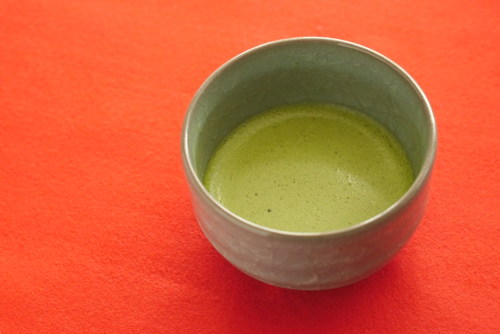Posted by TOKYO MATCHA SELECTION - Chris Young (living in UK) on 16th Dec 2017
If you do not own a matcha whisk, or even if you do, you may be wondering exactly why such an implement is necessary to achieve a fine cup of matcha. In this post, we'll be explaining why the traditional bamboo whisk is so important and how to use and care for it properly.
WHY DO WE WHISK MATCHA?
The first thing to know about matcha is that it does not dissolve like other powdered drinks to which you may be accustomed. Simply pouring hot water over matcha and stirring will most likely result in a watery beverage complete with bitter lumps, which may leave you wondering why anyone enjoys matcha at all!
Long ago, people discovered that matcha is best savoured as a suspension, which is the chemical term for an even distribution of fine solid particles throughout a liquid. In order to suspend the fine matcha powder in hot water, it is necessary to introduce a lot of air into the mixture. This is where the bamboo whisk comes into its own. The tiny bubbles created by whisking not only support the matcha particles, but also create the drink's soft, smooth mouthfeel. This is why some people describe a good cup of matcha as 'creamy'; it is similar to the texture of fat globules suspended in milk, only far more refreshing.
Successful whisking is aided by two factors: the shape of the bowl and the volume of water used. It is no coincidence that traditional matcha bowls are shallow and wide-mouthed; this is to allow enough space for proper whisking. As for the volume, it is important to note that the correct serving size for matcha is quite small. In the tea ceremony, a bowl is supposed to be finished in just two and a half sips! One serving is therefore no larger than 70 millilitres (two and a half ounces). If it were any larger, it would be difficult to whisk thoroughly.
WHISKING TIPS
1. When whisking, hold the whisk upright and use a fast zigzag motion to create the foam. Try to barely touch the bottom of the bowl, as the points of the bamboo whisk are delicate.
2. Lift the whisk upwards through the mixture as you finish whisking to make sure the bubbles you leave are as small and even as possible. Some people spend years perfecting this technique, so don't worry too much if you are just starting out.
3. Remember that part of the charm of matcha is that every bowl is unique, according to the person who prepares it. Enjoy the moment of preparing and drinking matcha as a mindful break in your day.
For more guidance on preparing matcha, watch our relaxing instructional video below!
CARING FOR YOUR MATCHA WHISK
If you care for your matcha whisk correctly, it should serve you well for a long time. You don't really need any special knowledge for this; it is enough to understand and respect the material from which the whisk is made. Bamboo is still favoured for matcha whisks for a variety of reasons: it is gentle and flexible, non-scratching, durable, naturally antibacterial, and will not impart any metallic or unnatural flavours to the matcha itself.
After preparing matcha, simply rinse the ends of the whisk in hot water without using any detergent or scrubbing implements. Then, gently shake the whisk off and stand it up for a while to dry naturally. To avoid damage, store the whisk carefully in its box, rather than rattling around in a drawer.
OUR RECOMMENDATIONS
Chasen Set : Matcha Bamboo Whisk 80 & Whisk Stand (2 color)

The history of utensils There are many utensils for Japanese tea ceremony. The utensils are not just tools but they are something that contributes to Japanese tea ceremony as an integrated art. People who participate in Japanese tea ceremony can enjoy appreciating them. The culture of Japanese tea ceremony came from China. So, utensils for Japanese [...]